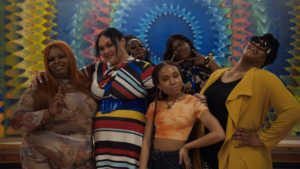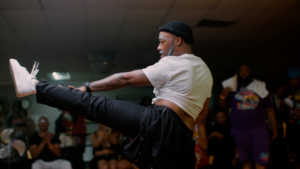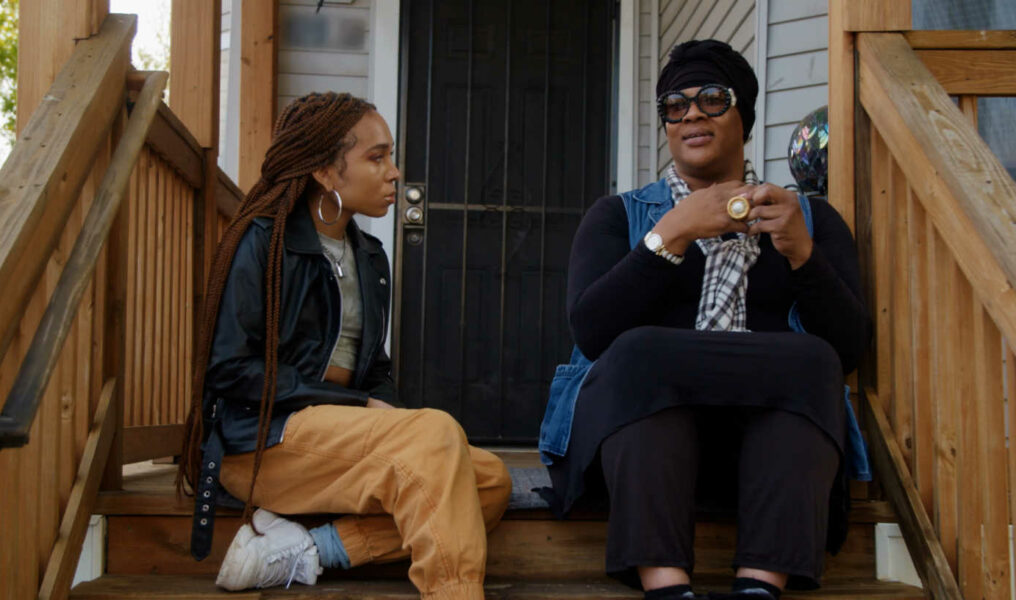When VICE News sent a film crew to Detroit to shoot a documentary about the life and death of Kelly Stough, a Detroit transgender woman brutally murdered in 2018, it quickly became clear the crew didn't have the whole story.
That's when Lilianna Angel Reyes Ebony and Jey'nce Mizrahi Poindexter stepped in. The pair are "godmothers" in the Detroit Ballroom scene, a decades-old cultural movement that supports Black and Latinx LGBTQ+ community members in crucial ways. The two made it clear that "Love Us in the Light," the first episode of the new VICE News series "Transnational," would only be complete if it depicted the importance of that scene to her while also honoring Stough and her life.
Mizrahi Poindexter remembers Stough, who was a spiritual woman, as "funny and loving." And Reyes Ebony called her "amazing." Both Stough and Reyes Ebony were sisters in the renowned international Ballroom House of Ebony. Being an active part of the Ballroom scene was important to Stough, who was "very supportive of the girls," said Reyes Ebony.
"It was our idea that they film something more personable," she recalled. "VICE came with the notion that they were going to only talk about Kelly, and we decided that we wanted to show them a little bit of resiliency, so it was actually our idea."
Mizrahi Poindexter concurred.
"We didn't want to just wallow in trauma and hurt and pain," she explained. "What we wanted to do is show the strength, the inner communal strength, and the love that is transformative and that really has kept us [going] through all the trauma and hurt."
As for the title "Love Us in the Light," it refers to straight men who try to hide — or keep in the dark — their relationships with trans women of color. Stough, herself, was allegedly killed by an intimate partner — a pastor she encountered through sex work. The suspect is currently out on bond awaiting trial.
"Many, many, many of the trans women of color who are murdered are murdered by people who have been close to them and/or have been lovers to them," Reyes Ebony said. She added that Black and brown men are often ashamed to be open about their love for trans women of color "because society will label them gay, or other or whatever."
In the episode, Reyes Ebony says she has "stopped keeping count" of how many loved ones she has lost to violence.
Reyes Ebony said loss is something she'll never get used to — and shouldn't have to. Still, as a community leader, she's often the first to hear about a murder or act of violence and the first to recount these incidents with loved ones.
"I think that most of the [Pride Source] readers will never know what that [loss is] like," Reyes Ebony said. "It's not something we aim to know."
Reyes Ebony is acutely aware of differences she sees between her community and majority white LGBTQ+ organizations — white trans organizations in particular. "While other people are gathering for fun and for arts and crafts," she said, "we are gathering to try to stop Black and brown trans women from dying. They don't really do work across 8 Mile."
Reyes Ebony said white trans women often come out later in life than trans women of color — she surmises that "visibility" is often an integral part of that process. However, she said, being "visible" for Black and brown trans women can mean risking death.
Certainly, both Reyes Ebony and Mizrahi Poindexter are visible leaders of the LGBTQ+ community.

Lilianna Angel Reyes Ebony (second from left) and Jey'nce Mizrahi Poindexter (far right) in a group portrait. Photo courtesy of VICE
Reyes Ebony directs the drop-in program at the Ruth Ellis Center (REC) and serves as executive director of the local Trans Sistas of Color Project (TSOCP), an organization whose mission is to uplift, influence and impact the lives and well-being of trans women of color. While they provide various support services, most donations received by the group go toward emergency assistance and funds for funeral arrangements when there's a community need. TSOCP receives no grant money and relies on donations.
Mizrahi Poindexter is a case manager at REC and communications director for TSOCP. They are also mothers in their respective Ballroom "houses."
Like biological motherhood, it's a 24-hour job, Mizrahi Poindexter pointed out. A mother doesn't get to choose her children based on their personalities and characteristics. If a call comes in that someone has been hurt or shot, a mother simply takes action.
"Because I transitioned young, I may not ever have the ability to have children," Reyes Ebony said, though she doesn't desire biological children. "My kids are everything. They're my chance at being a mother. I house them. I feed them. I take them places. I am their mother when their biological parents cannot be there because of their LGBT-ness."
"I would die for my children," she said.
It's a sentiment Mizrahi Poindexter wholeheartedly agrees with. "My biological mother passed away," Reyes Ebony continued. "All I have is Jey'nce," she said, referring to Mizrahi Poindexter, her chosen mother.
In VICE's "Love Us in the Light," Reyes Ebony talks about her role as Godmother of the House of Ebony, which she's been a part of for over a decade. The House's focus on Black beauty speaks most to Reyes Ebony.
"I am a Mexican woman," Reyes Ebony said. "But I believe that all liberation is connected to Black liberation, so I want to start there. And so any place that uplifts Black beauty and Black liberation is important to me."
Always a leader in her House, Reyes Ebony spoke with a father of the House of Ebony — who's also her son — about her future role there.
"And so I was honored by him and by the leaders overall to be deemed as the Godmother," Reyes Ebony said. "And that is one of my biggest accomplishments in my career — and I say career, period. Because that is something that's really beautiful to me: I am a godmother of an international, iconic house that focuses, and has focused, on Black beauty and Black liberation."
Reyes Ebony also shared that Mizrahi Poindexter was recently deemed Queen Mother of the House of Mizrahi, which means she's mother to all Houses of Mizrahi, in all regions. No one has more power or influence.
"It definitely is an accomplishment because not too many people can rise to that level," Mizrahi Poindexter said. Like Reyes Ebony, she also has achieved a great deal in her professional career. "For that to also be mirrored in Ballroom, it's something that I'm really, really proud of," she said.

A scene from "Transnational."
When it came to "Love Us in the Light," Reyes Ebony aimed to showcase the resiliency of the Detroit Ballroom scene. She wanted to show the support local community members offered one another in the wake of Stough's death. Mizrahi Poindexter explained that she learned resiliency — the kind that sustains her in her advocacy work today — through her position in the Ballroom community.
"I had to arrive and provide for my children in the Ballroom scene," Mizrahi Poindexter said. "I had to help my children prepare," she said, whether that meant practicing how to walk or assisting with makeup. She's also adept at helping community members struggling with mental health issues or those living with HIV. "So many of those skills transferred over into the way that I approach advocacy because I know what it means to be there for a person," she said.
"I know all of that because I learned it in the Ballroom realm," she added.
Reyes Ebony said Ballroom is a special place where people with similar struggles who, like Stough did, come together and "shine," even if the rest of the world doesn't let them.
"Up until now, Black and brown LGBT talents did not matter," Reyes Ebony said. "We were in the background. We did people's hair; we did people's makeup." She said that's changing now only because of Ballroom's place in popular culture. And that Detroit's Ballroom scene is unlike any other: "A place for us, by us."










